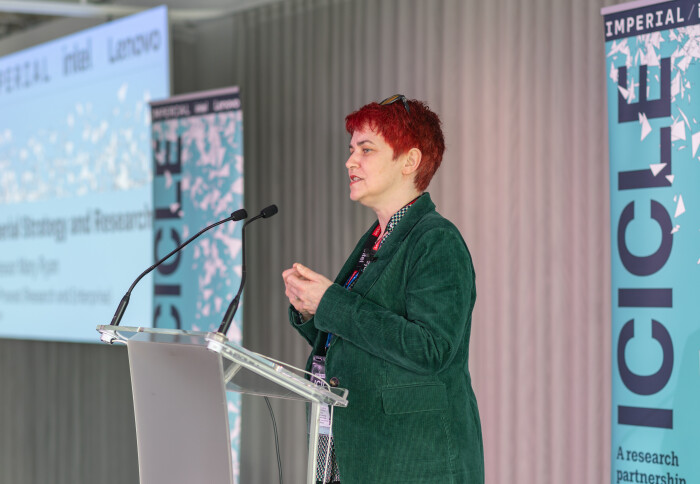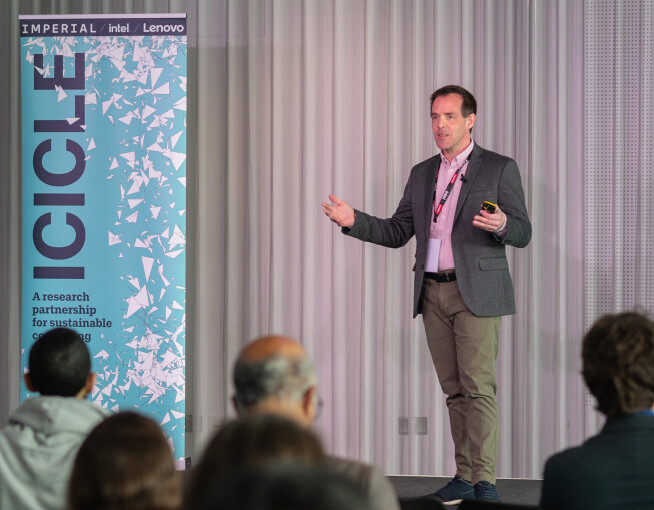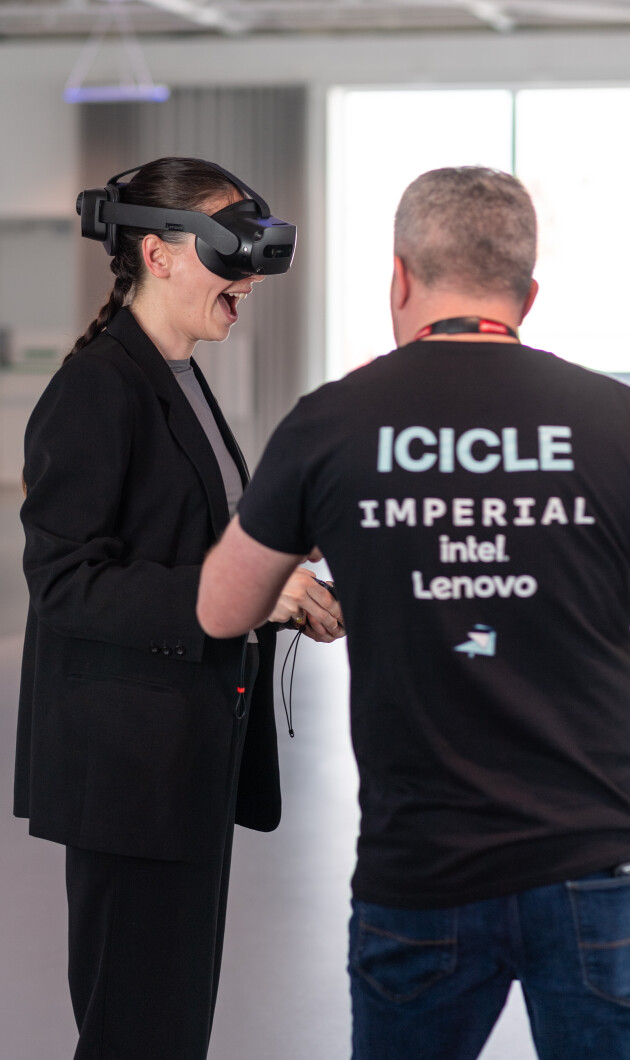Transforming research through computing with ICICLE: Imperial, Intel and Lenovo

Professor Mary Ryan, Vice-Provost (Research and Enterprise) opened the ICICLE event
Imperial celebrates the launch of its new supercomputing facility and the ICICLE partnership enabling next-generation HPC for our researchers
Imperial celebrated the launch of its new supercomputing facility and the ICICLE partnership with a meeting of academics, technology specialists and collaborators at the Science Museum in May.
Professor Mary Ryan, Vice-Provost (Research and Enterprise), opened the day and outlined how the ICICLE partnership between Imperial, Intel and Lenovo supports Imperial’s new strategy and recognises Imperial’s founding mission to ’be useful’ when applying research to industry.

Dr Andrew Richards, Director of Research Computing Services, hosted a showcase of Imperial researchers who use the university’s new computing facility to better understand the world, develop new sustainable technologies and help shape national policies.
Enthusiastic academics spoke about the impact of high-fidelity computational modelling for fluids, the importance of robust geological modelling, forecasting for space weather and much more.
Guests also heard more about our new High Performance Computer named HEX, they saw the latest developments in research software engineering and careers, and explored new services such as the Trusted Research Environment and our improved support for data-intensive research.
Professor Michael Bearpark, the service’s Academic Director, emphasised the potential for ‘research through computing’, and the university’s partnership between academic and professional services represented by this service.
We are looking forward to revolutionising research across Imperial with our newest HPC system Dr Andrew Richards Director of Research Computing Services
One of the many highlights of the day was two new PhD students, Arianna Cox and Louis Choron being able to meet their sponsors and explaining how the funding will be transformative for them personally as well as the research they’ll carry out.
Louis said: "I very much enjoyed attending the ICICLE launch event and was immediately impressed by the scale of the collaboration. It was exciting to meet various members of both Intel and Lenovo, hear their passion for supporting young researchers, and gain insights into their future projects. I believe that having the support of such influential and innovative collaborators puts students in a highly active environment for research and provides a unique setting for developing a career."
What is ICICLE?
 The ICICLE collaboration is not just about High-Performance Computing (HPC). ICICLE means Lenovo and Intel will support Imperial’s long-term plans for research, provide early access to emerging technologies and support college initiatives to create gender balance. This will benefit all faculties, from Engineering to Natural Sciences, Medicine, and the Business School. It will give researchers and their industry partners access to next-generation HPC to help tackle global challenges. We will also nurture the next generation of researchers and prepare Imperial's students for the amazing opportunities in the HPC and AI fields, as both researchers and future technology specialists.
The ICICLE collaboration is not just about High-Performance Computing (HPC). ICICLE means Lenovo and Intel will support Imperial’s long-term plans for research, provide early access to emerging technologies and support college initiatives to create gender balance. This will benefit all faculties, from Engineering to Natural Sciences, Medicine, and the Business School. It will give researchers and their industry partners access to next-generation HPC to help tackle global challenges. We will also nurture the next generation of researchers and prepare Imperial's students for the amazing opportunities in the HPC and AI fields, as both researchers and future technology specialists.
A sustainable future
To futureproof this partnership, we are committed to sustainability as part of Imperial’s Zero Pollution ambition. We heard from Vinod Kamath, Lenovo’s Distinguished Engineer and Thermal Architect, on how Imperial’s future high-density computing systems will be water cooled using technologies developed and refined over the past decade, inspired in part by research carried out at Imperial.
As a result, the next iteration of HEX - RCS’s supercomputer built on Lenovo ThinkSystem servers with Neptune™ liquid cooling technology - will consume less power and produce fewer carbon emissions. Establishing partnerships such as ICICLE brings access to the industry-leading expertise that enables long-term planning while supporting research more sustainably.
Intel and Lenovo are committed to nurturing the next generation of HPC and AI scientists, and as part of this will sponsor PhD students through the ICICLE partnership and UKRI iCase programme. PhD projects will explore new computer processors, quantum computing algorithms and accelerated machine learning. As part of this collaboration, students will be given remote access to Intel’s DevCloud and software development platforms.
Who are Imperial’s Research Computing Services team?
Research Computing Services provides central support for the computational research ecosystem at Imperial. The team develops research computing and research data infrastructures, maintain the university's research management applications and provide specialist software development consultancy.
In fulfilling all these roles, the service builds external collaborations, supports applications for external research funding, and collaborates internally with teams across ICT e.g. with networks and security to make sure Imperial researchers can access the resources they need to carry out leading research.
Get in touch with the RCS team, they are always happy to help.
You can find out more about the ICICLE partnership, RCS events and news by signing up to the RCS newsletter.
Thank you to all our speakers
Thank you to event speakers:
- Mary Ryan, Vice-Provost Research and Enterprise
- Michael Bearpark, Academic Director of Research Computing Services
- Andrew Richards, Director of Research Computing Services
- Lyes Kahouadji, Research Fellow in Computational Fluid Dynamics
- Dugan Witherick, Head of Research Computing Platforms and Noel Papantonis, Technology Delivery Manager
- Jeremy Cohen, Advanced Research Fellow, Computing
- Lisa Lampunio, Research Associate, Mechanical Engineering
- Gerard Gorman, Professor of Computational Science and Engineering
- Vinod Kamath, Distinguished Engineer, Lenovo
- Jonathan Eastwood, Professor of Space Physics
- Robert Maskell, Lenovo and David Clarke, Intel
Article text (excluding photos or graphics) © Imperial College London.
Photos and graphics subject to third party copyright used with permission or © Imperial College London.
Reporter
Liz Scholfield
Communications Division